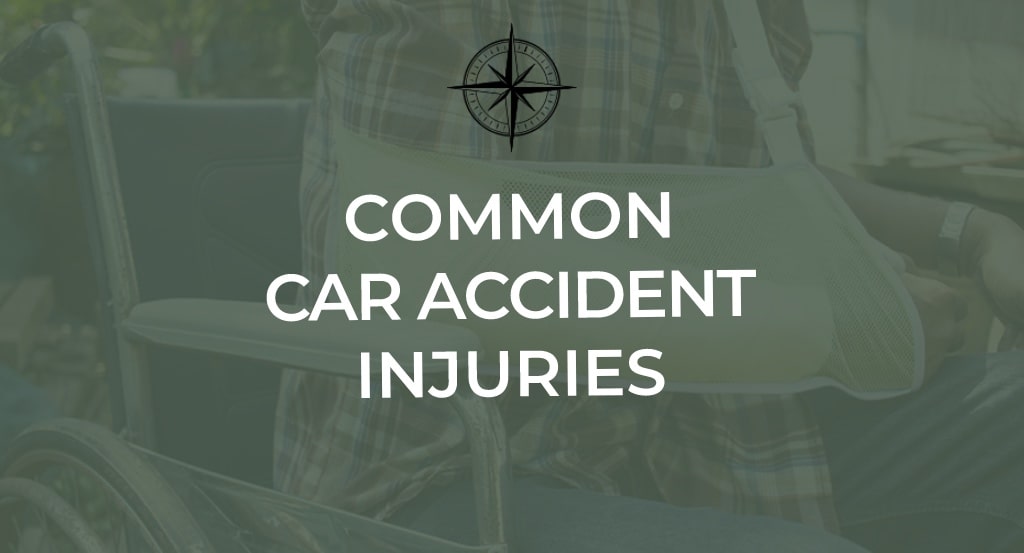Brooke graduated from the University of Richmond School of Law after receiving her undergraduate degree from the University of North Carolina at Chapel Hill. Brooke worked for five years in private practice with a law firm specializing in insurance defense litigation before becoming the trial litigator for Allstate Insurance Company in the metro Richmond area.
There are several types of injuries associated with car accidents, but some are more common than others.
According to the National Highway Traffic Safety Administration (NHTSA), more than 2.7 million people sustain an injury in car accidents every year.
While a majority of crashes do not have a reported injury, the ones that do often involve serious injuries with life-altering consequences. Below, are six of the most common injuries from car accidents in Virginia.
If you have been in a car accident and sustained injuries, you may need an attorney. Contact the experienced Virginia car accident lawyers at River Run Law today to learn how our team can help you.
Seek Medical Help After a Car Accident
Common injuries from car accidents may not be immediately recognizable.
Since symptoms may not show up for a few days, weeks, or months, it is important to seek medical attention following a car accident, even if the crash seems minor.
Early intervention will not only prevent your condition from getting worse but will also give you the medical evidence you need for your claim.
Below, our Virginia personal injury lawyers cover six common injuries one can sustain after a car accident.
Scrapes and Cuts
Cuts are typical car accident injuries, usually caused by objects inside the vehicle or debris from the crash.
Glass, plastic parts, and metal all pose a risk of causing scrapes and cuts in a car accident.
While the injury may seem minor at first, it doesn’t take much for the wound to excessively bleed or become infected.
For this reason, it’s important to have your injury examined by a doctor to ensure that it is properly treated.
Keep an eye out for redness, swelling, or pus around the wounds, as these signs could indicate an infection.
Soft Tissue Damage
One of the most common injuries sustained by a vehicle collision is soft tissue damage.
This type of injury occurs in both minor and severe accidents and involves trauma to the skin, tendons, ligaments, or muscles.
While the trauma is usually caused by blunt force, it sometimes occurs due to lacerations, sprains, or abrasions.
Symptoms of soft tissue damage include:
- Swelling,
- Bruising,
- Limited range of motion,
- Muscle cramps,
- Muscle weakness, and
- Joint pain.
The most common injury in a vehicle collision involving soft tissue damage is whiplash. This injury happens when the muscles of the head and neck stretch too much during an accident.
Dislocations & Fractures
Since cars compress when they collide with other vehicles, it’s common for victims to have bone dislocations or fractures. The areas of the body most susceptible to this type of injury are the ankles, wrists, arms, legs, and ribs.
Simple breaks or dislocations may only require a cast, while compound fractures may need extensive surgery.
Unfortunately, the compound breaks often result in permanent strength and mobility issues. In addition, victims may experience chronic pain around the surgical site due to the plates and screws used to rebuild the bone.
Spinal Cord Injuries
Injuries to the spine or back are some of the most serious injuries possible in a car accident. The spine isn’t designed to take the forceful impacts associated with a car accident.
As a result, victims with back injuries like slipped or ruptured disks have long-lasting complications with posture, movement, and pain.
In more serious cases, a fractured spine may lead to the development of paraplegia or quadriplegia. These injuries usually require lifelong care, resulting in extensive future medical costs for the victim and their family.
Chest Injury
Chest injuries are some of the most serious injuries in car accidents.
While some chest injuries may involve minor bruising, others often require surgery to repair internal organ damage, broken ribs, and more.
The most common symptoms of a chest injury are:
- Bruising,
- Swelling,
- Redness,
- Coughing,
- Shortness of breath,
- Shallow breathing,
- Crackling in the chest,
- Changes in heart rate, and
- Low blood pressure.
Unlike other parts of the body, the chest is at a higher risk of blunt force trauma. This is due to the small distance between the chest and other parts of the vehicle, such as the seatbelt, wheel, or airbag.
Amputation
Amputation is just one of the many possible injuries that can result from a car accident.
When something in the crash cuts off a limb or causes enough damage to a limb that a doctor must amputate, serious lifelong alterations result.
In general, a traumatic amputation occurs when a limb becomes severed from the body due to extreme lacerations or fractures.
However, an amputation may need to be performed by first responders if the limb loses a significant amount of blood flow or is at a severe infection risk. Both instances are common in car accidents.
Like other common injuries from car accidents, loss of limb carries a high financial burden.
To regain some degree of function, victims often require expensive prosthetics and extensive rehabilitation.
In addition, prosthetics need to be replaced or upgraded often.
Traumatic Brain Injury (TBI)
Also known as TBIs, traumatic brain injuries are the most deadly injuries associated with car accidents. According to the CDC, more than 61,000 people died from a traumatic brain injury in the United States in 2019.
Most often, the victim experiences a concussion after hitting their head on the side window or steering wheel.
In a severe accident, the amount of trauma usually leads to permanent brain damage or disfigurement.
Some traumatic brain injuries do not show any symptoms until days or even weeks after the crash.
Here are some symptoms to watch out for:
- Headaches,
- Nausea,
- Dizziness,
- Bleeding,
- Changes in behavior,
- Loss of consciousness,
- Loss of balance,
- Loss of coordination,
- Memory issues,
- Blurred vision, and
- Difficulty speaking.
If you experience any of these symptoms after a car accident, please seek medical attention immediately.
Traumatic brain damage can be difficult to detect and may result in permanent cognitive damage if left untreated.
Spinal Cord Injury
Out of all common injuries in car accidents, spinal cord injuries cause the most lasting complications.
Damage to the spinal cord or nerves causes permanent changes in strength and sensation below the affected area.
In many cases, victims experience reduced motor and sensory function, also known as paralysis.
The severity of the injury often determines the type of paralysis experienced by the victim.
Paraplegia is the most common form of paralysis after a car accident and affects the lower parts of the body, such as the pelvis and legs.
If the trauma occurs higher on the spinal cord, it may result in more serious forms of paralysis, such as tetraplegia or quadriplegia. In this case, the arms, pelvis, and legs may be fully or partially immobilized.
Paralysis is also one of the most expensive conditions to treat.
According to the National Spinal Cord Injury Statistical Center (NSCISC), individuals with paraplegia have more than $567,000 in medical expenses during the first year of their injury.
This figure increases with more severe conditions, with low tetraplegia costing $840,708 in the first year and high tetraplegia costing more than $1.14 million.
Psychological Injuries
Car accidents are an incredibly traumatic experience, especially when they result in injury. Many victims often have flashbacks, guilt, or other mental stresses afterward.
In some cases, victims may be diagnosed with a mental health condition such as PTSD or depression, that makes daily routines difficult.
How to Minimize the Risk of Common Car Accident Injuries
While it’s not possible to control every driver on the road, there are a few ways to avoid common car accident injuries and symptoms.
First, always wear your seatbelt. According to the National Highway Traffic Safety Administration, seatbelts save almost 15,000 lives every year in the US. In addition, 47% of all passengers who died in 2019 weren’t wearing a seatbelt.
Second, make sure you follow the speed limit. Generally, crashes that happen at higher speeds result in more severe injuries. By obeying the speed limit, you reduce the chance of a serious crash.
Finally, keep your vehicle in working order. Be sure to check your brakes and airbags regularly, as these parts may be vital in the event of an accident.
Contact an Experienced Virginia Car Accident Attorney Today
At River Run Law, we know the devastating impact that these injuries have on victims and their families. That’s why we were named Best of Richmond in 2021.
Whether your injury results in a short-term disability or lifelong complications, our Virginia personal injury attorneys in Richmond, VA will fight for the support you need to recover.
If you or a loved one sustains an injury in a car accident, contact us online or call (804) 889-0500 to schedule a free consultation.
Related Posts
Most Common Internal Injuries from Car Accidents in Virginia



